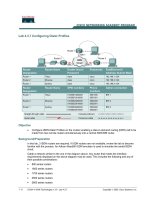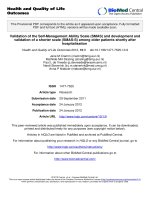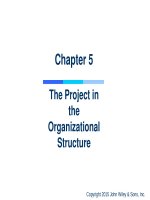Lecture Project management in practice - Chapter 5: Defining the scope of a project
Bạn đang xem bản rút gọn của tài liệu. Xem và tải ngay bản đầy đủ của tài liệu tại đây (1.07 MB, 26 trang )
CHAPTER 5
Defining the Scope
of a Project
Copyright © 2013 McGraw-Hill Education (Australia) Pty Ltd
Pearson, Larson, Gray, Project Management in Practice, 1e
5-1
Learning Elements
5.1
Understand the importance of scoping a project,
how it defines what the project is to achieve, in
what timeframe and at what cost.
5.2
Develop a comprehensive Scope document and
understand some of the practical techniques that
can be applied in developing the content for the
Scope document.
5.3
Understand how the Scope Management Plan
differs from the Scope document, and define and
establish a process for change management in
project environment.
Copyright © 2013 McGraw-Hill Education (Australia) Pty Ltd
Pearson, Larson, Gray, Project Management in Practice, 1e
5-2
Introduction
nswers the most obvious question, but also the
most commonly overlooked one:
hat problem is being solved by delivering
this project?
Copyright © 2013 McGraw-Hill Education (Australia) Pty Ltd
Pearson, Larson, Gray, Project Management in Practice, 1e
5-3
Documents Output from
Scoping Activities
•
•
•
•
•
Project Charter
Project Scope document
Work Breakdown Structure (WBS)
Scope Management Plan
Estimating Artefacts
Copyright © 2013 McGraw-Hill Education (Australia) Pty Ltd
Pearson, Larson, Gray, Project Management in Practice, 1e
5-4
How Scoping Fits into the Text
Copyright © 2013 McGraw-Hill Education (Australia) Pty Ltd
Pearson, Larson, Gray, Project Management in Practice, 1e
5-5
Copyright © 2013 McGraw-Hill Education (Australia) Pty Ltd
Pearson, Larson, Gray, Project Management in Practice, 1e
5-6
The Scope Process
Step 1:
Defining the Project Scope
Step 2: Creating the Work Breakdown
Structure (WBS)
Step 3: Integrating the WBS with the
Organisation
Step 4: Estimating: Moving Towards a
Draft Budget and Schedule
Copyright © 2013 McGraw-Hill Education (Australia) Pty Ltd
Pearson, Larson, Gray, Project Management in Practice, 1e
5-7
Step 1: Defining the
Project Scope
• The primary purpose is to define as clearly as
possible the deliverable(s) of the project.
• To be used by the project sponsor and other
stakeholders for measuring project success.
Copyright © 2013 McGraw-Hill Education (Australia) Pty Ltd
Pearson, Larson, Gray, Project Management in Practice, 1e
5-8
Step 1: Defining the
Project Scope (cont)
• To clearly define the deliverable(s) for the end
user.
• To focus the project on successful completion
of its goals.
• Inadequate scope definition is a primary
reason for project failure.
Copyright © 2013 McGraw-Hill Education (Australia) Pty Ltd
Pearson, Larson, Gray, Project Management in Practice, 1e
5-9
Project Scope Checklist
Copyright © 2013 McGraw-Hill Education (Australia) Pty Ltd
Pearson, Larson, Gray, Project Management in Practice, 1e
5-10
The Triple Constraints
Copyright © 2013 McGraw-Hill Education (Australia) Pty Ltd
Pearson, Larson, Gray, Project Management in Practice, 1e
5-11
The Triple Constraints (cont)
Copyright © 2013 McGraw-Hill Education (Australia) Pty Ltd
Pearson, Larson, Gray, Project Management in Practice, 1e
5-12
The Triple Constraints (cont)
• Constrain
The original parameter is fixed. The project
must meet the completion date, specifications
and scope of the project or budget.
• Enhance
Given the scope of the project, which criterion
should be optimised?
• Accept
For which criterion is it tolerable not to meet
the original parameters?
Copyright © 2013 McGraw-Hill Education (Australia) Pty Ltd
Pearson, Larson, Gray, Project Management in Practice, 1e
5-13
Step 2: Creating the Work
Breakdown Structure (WBS)
• A hierarchical outline (map) that identifies
the products and work elements involved in
a project.
• Defines the relationship of the final
deliverable (the project) to its subdeliverables and in turn their relationships to
the work packages.
Copyright © 2013 McGraw-Hill Education (Australia) Pty Ltd
Pearson, Larson, Gray, Project Management in Practice, 1e
5-14
Hierarchical Breakdown of the WBS
Copyright © 2013 McGraw-Hill Education (Australia) Pty Ltd
Pearson, Larson, Gray, Project Management in Practice, 1e
5-15
Creating the Work
Breakdown Structure (WBS)
• Facilitates evaluation of cost, time and
technical performance of the organisation on
a project.
• Provides management with information
appropriate to each organisational level.
• Helps manage plan, schedule and budget.
Copyright © 2013 McGraw-Hill Education (Australia) Pty Ltd
Pearson, Larson, Gray, Project Management in Practice, 1e
5-16
Creating the Work Breakdown
Structure (WBS)(cont.)
• Helps in the development of the
organisation breakdown structure (OBS)
which assigns project responsibilities to
organisational units and individuals.
• Defines communication channels and
assists in coordinating the various
project elements.
Copyright © 2013 McGraw-Hill Education (Australia) Pty Ltd
Pearson, Larson, Gray, Project Management in Practice, 1e
5-17
WBS Brainstorming Techniques
hiteboards, Brainstorming, Post-It® Notes,
Mind Maps, Facilitators
Copyright © 2013 McGraw-Hill Education (Australia) Pty Ltd
Pearson, Larson, Gray, Project Management in Practice, 1e
5-18
Example of a Work Package
or ‘Pack’ Contents
Copyright © 2013 McGraw-Hill Education (Australia) Pty Ltd
Pearson, Larson, Gray, Project Management in Practice, 1e
5-19
Step 3: Integrating the WBS
with the Organisation
epicts how the firm is organised to discharge its
work responsibility for a project.
• Provides a framework to summarise
organisation work unit performance.
• Identifies organisation units responsible
for work packages.
• Ties the organisational units to cost control
accounts.
Copyright © 2013 McGraw-Hill Education (Australia) Pty Ltd
Pearson, Larson, Gray, Project Management in Practice, 1e
5-20
Integrating the WBS and OBS—
House Build Example
Copyright © 2013 McGraw-Hill Education (Australia) Pty Ltd
Pearson, Larson, Gray, Project Management in Practice, 1e
5-21
Step 4: Estimating
he journey from WBS to estimating and the creation of
the budget schedule and resource matrix.
Copyright © 2013 McGraw-Hill Education (Australia) Pty Ltd
Pearson, Larson, Gray, Project Management in Practice, 1e
5-22
The Scope Management Plan
Typical contents
•
The process to be applied for all project
change/variation requests.
•
The process for scope verification.
•
The process for deliverable acceptance.
•
How lessons learned will be captured and applied
within the project.
Copyright © 2013 McGraw-Hill Education (Australia) Pty Ltd
Pearson, Larson, Gray, Project Management in Practice, 1e
5-23
Change/Variation Control
Management
Copyright © 2013 McGraw-Hill Education (Australia) Pty Ltd
Pearson, Larson, Gray, Project Management in Practice, 1e
5-24
Project Scope Integration
Copyright © 2013 McGraw-Hill Education (Australia) Pty Ltd
Pearson, Larson, Gray, Project Management in Practice, 1e
5-25









